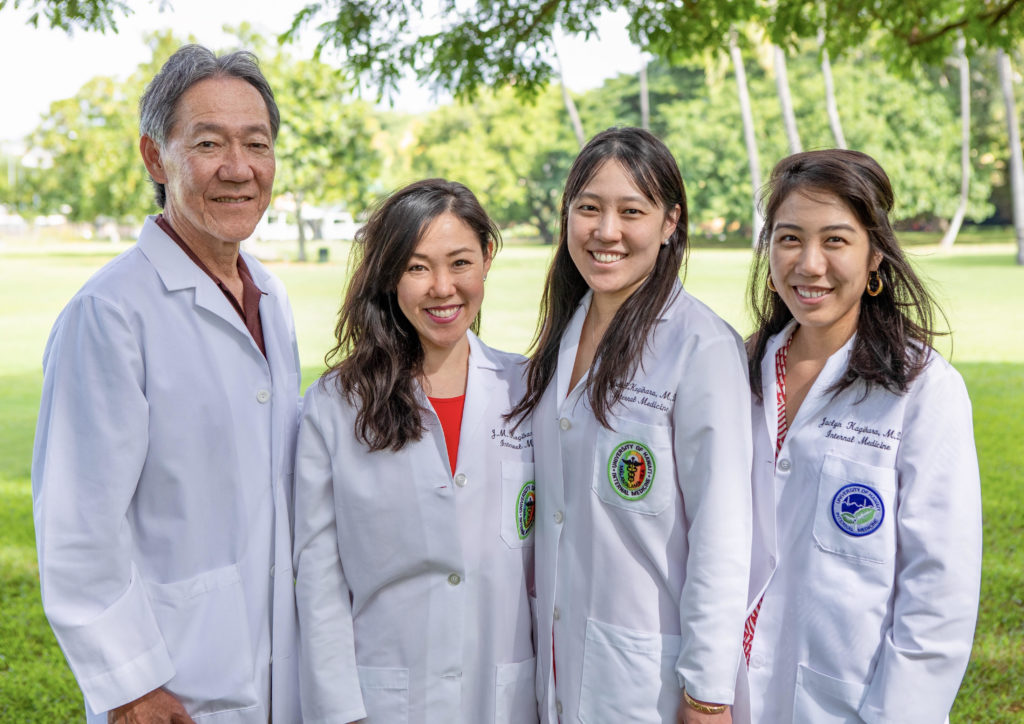The Kagihara sisters – Jamie ’04, Jodi ’06 and Jaclyn ’08 – are physicians fighting COVID-19. Jamie is a pulmonary critical care intensivist at Torrance Memorial Medical Center in Los Angeles. Jodi is a hematology/oncology fellow at University of Colorado Anschutz Medical Campus in Denver, and Jaclyn is chief medical resident at The Queen’s Medical Center in Honolulu. Their father, Lance, is an internal medicine specialist at Kuakini Medical Center.

Jamie: I’m one of seven intensivists who work in the ICU doing 12-hour shifts. I manage our most critical COVID patients who are admitted and transferred to the ICU. My colleagues and I are responsible for intubating those patients who needed to be placed on a ventilator, managing their sedation, and weaning from the breathing machine should they improve. In the beginning, my staff and I used trash bags as hair/head protection and we have had to re-use masks for multiple patients and on consecutive days. Thanks to several community donations, we now have some hair covers and extra N95 masks.
Jodi: I am a second year fellow completing my fellowship in Hematology and Oncology with a focus on breast cancer. During this pandemic, fellows are asked to help with management of hematologic complications of COVID-19 and have been working in our clinics to best take care of our oncology patients who may be immunosuppressed from chemotherapy.
Jaclyn: As Chief Medical Resident, I am responsible for overseeing 60 residents who are a part of the University of Hawai’i Internal Medicine Residency Program. My main priority at this time is ensuring the physical and mental wellbeing of my residents who are directly involved in the care of patients with possible COVID-19 infection.
Jodi: Although it has been tough to be far away from family during this time, we have been able to share our experiences living in different states. Jamie, who lives in California, was the first to feel the effects of COVID-19 and Colorado followed shortly after. We were able to alert our family in Hawai’i of the changes in the hospitals and community before the outbreak there. Jamie, who had been taking care of patients in the Intensive Care Unit, told us about the severity of the disease, how sick these patients can get and how they are being treated.
Jaclyn: In regard to this pandemic, Hawai’i is in a very unique position. We have the benefit of being about a month behind the continental U.S. We are able to heed the warnings from epicenters like New York City and Seattle and act accordingly. Additionally, being such an isolated population center is advantageous as we can limit the number of visitors and potential COVID-19 carriers flying to our State. At the same time, that isolation makes Hawai’i especially vulnerable. Securing medical resources like personal protective equipment, medications and ventilators becomes a more difficult and lengthier process. The option to call-in additional medical staff – physicians, nurses, respiratory therapists – is not possible due to travel restrictions and quarantine recommendations.
Jaclyn: As physicians, part of our job is to anticipate the natural history of a disease process and to know the potential complications, so that when the worst-case scenario does happen, we are prepared and not surprised. Typically, we can find the answer to a question we do not know by reading the medical literature or discussing with a colleague, but now we suddenly must practice medicine blindfolded.
Jamie: Our father has always been the voice of reason for my sisters and I, and when we find ourselves emotionally distraught with the deaths, as well as the failure of the experimental drugs we’re trying against this Novel SARS-COV2 virus, he explains, “As a physician we can only do what we have been trained to do. So much of this is fate and out of our control. Do what you were taught with the best of your ability and compassion.”
Jodi: Fortunately with the ease of technology, we have been able to keep in touch. With so much focus on coronavirus in the media, we made it a point to spend time not thinking about coronavirus but instead enjoying videos of Jamie’s 1-year-old son, Coen, and playing games online with our cousins.
Jaclyn: This experience has forced me to slow down, stop and evaluate what is important to me. After the pandemic, the simple things like a hug, a meal at a restaurant and watching a live telecast of my favorite sports teams will mean so much more.
